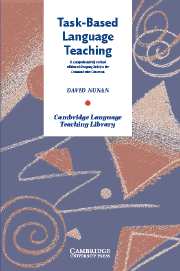Book contents
- Frontmatter
- Contents
- Acknowledgements
- Introduction
- Chapter 1 What is task-based language teaching?
- Chapter 2 A framework for task-based language teaching
- Chapter 3 Task components
- Chapter 4 An empirical basis for task-based language teaching
- Chapter 5 Focus on form in task-based language teaching
- Chapter 6 Grading, sequencing and integrating tasks
- Chapter 7 Assessing task-based language teaching
- Chapter 8 Tasks and teacher development
- Appendix A Approaches and methods – an overview
- Appendix B A unit of work based on the six-step procedure presented in Chapter 2
- Appendix C A unit of work based on the task/exercise typology in Chapter 5
- Appendix D Graded activities for the four macroskills
- Appendix E Common reference levels: self-assessment grid
- Glossary
- Index
Chapter 1 - What is task-based language teaching?
Published online by Cambridge University Press: 16 February 2010
- Frontmatter
- Contents
- Acknowledgements
- Introduction
- Chapter 1 What is task-based language teaching?
- Chapter 2 A framework for task-based language teaching
- Chapter 3 Task components
- Chapter 4 An empirical basis for task-based language teaching
- Chapter 5 Focus on form in task-based language teaching
- Chapter 6 Grading, sequencing and integrating tasks
- Chapter 7 Assessing task-based language teaching
- Chapter 8 Tasks and teacher development
- Appendix A Approaches and methods – an overview
- Appendix B A unit of work based on the six-step procedure presented in Chapter 2
- Appendix C A unit of work based on the task/exercise typology in Chapter 5
- Appendix D Graded activities for the four macroskills
- Appendix E Common reference levels: self-assessment grid
- Glossary
- Index
Summary
Introduction and overview
The concept of ‘task’ has become an important element in syllabus design, classroom teaching and learner assessment. It underpins several significant research agendas, and it has influenced educational policymaking in both ESL and EFL settings.
Pedagogically, task-based language teaching has strengthened the following principles and practices:
A needs-based approach to content selection.
An emphasis on learning to communicate through interaction in the target language.
The introduction of authentic texts into the learning situation.
The provision of opportunities for learners to focus not only on language but also on the learning process itself.
An enhancement of the learner's own personal experiences as important contributing elements to classroom learning.
The linking of classroom language learning with language use outside the classroom.
In this chapter, I will map out the terrain for the rest of the book. I will firstly define ‘task’ and illustrate the ways in which it will be used. I will then relate it to communicative language teaching and set it within a broader curriculum framework, as well as spelling out the assumptions about pedagogy drawn on by the concept. In the final part of the chapter I will look at the impact of the concept on the learner, on one hand, and on institutional policy and practice on the other.
Defining ‘task’
Before doing anything else, I need to define the central concept behind this book.
Information
- Type
- Chapter
- Information
- Task-Based Language Teaching , pp. 1 - 18Publisher: Cambridge University PressPrint publication year: 2004
Accessibility standard: Unknown
Why this information is here
This section outlines the accessibility features of this content - including support for screen readers, full keyboard navigation and high-contrast display options. This may not be relevant for you.Accessibility Information
- 2
- Cited by
